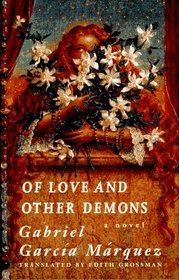Helpful Score: 1
It's a little bit mystifying to me that people get all hissy-fit-like about how 'The Golden Compass' is anti-religious when there are books like this around! I'm like, now THIS is an anti-religious book!
Set in colonial Latin America, the story is told in Marquez' beautiful, 'magical realist' style. A neglected young woman is nipped by a rabid dog in the marketplace. She shows no symptoms of disease, but, in fear, against the recommendation of the only shown-to-be-sensible character in the book, (an atheist jewish doctor), her father brings her for treatment at a convent. Once in the hands of the priests and nuns, it is decided that she is not ill but possessed (mainly because, having been brought up mostly by the slaves in her household, she speaks African languages). Although one of the men assigned to exorcise her believes that nothing is wrong with her, and falls in love with her, he really does not understand her, and he fails in every way to free her from the clutches of the Church, and she dies under torture.
Quoting the review from Publishers' Weekly: "This tragic tale is in essence an outcry against intolerance and bigotry and an indictment of a degraded Church that used its power with narrow-minded cruelty."
Excellent.
Set in colonial Latin America, the story is told in Marquez' beautiful, 'magical realist' style. A neglected young woman is nipped by a rabid dog in the marketplace. She shows no symptoms of disease, but, in fear, against the recommendation of the only shown-to-be-sensible character in the book, (an atheist jewish doctor), her father brings her for treatment at a convent. Once in the hands of the priests and nuns, it is decided that she is not ill but possessed (mainly because, having been brought up mostly by the slaves in her household, she speaks African languages). Although one of the men assigned to exorcise her believes that nothing is wrong with her, and falls in love with her, he really does not understand her, and he fails in every way to free her from the clutches of the Church, and she dies under torture.
Quoting the review from Publishers' Weekly: "This tragic tale is in essence an outcry against intolerance and bigotry and an indictment of a degraded Church that used its power with narrow-minded cruelty."
Excellent.




